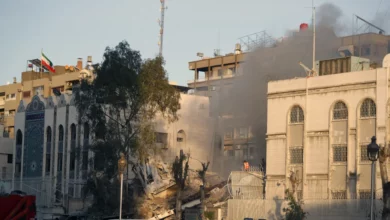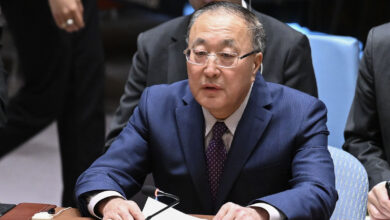Beirut – Syrian troops pounded a central town with artillery and heavy machinegun fire Friday, killing at least two people in the latest onslaught as authorities cut off Internet service in several regions in an apparent move to prevent the uploading of videos of anti-regime demonstrations, activists said.
The Local Coordination Committees, which helps organize and document Syria's protests, says troops bombing Rastan also opened fire on residents fleeing the town. Friday's deaths bring the toll in Rastan and nearby Talbiseh to 74 killed since the attack started last Saturday.
The bombing came as many Syrians took to the streets across the country after Friday prayers. The opposition has called for nationwide rallies to commemorate the nearly 30 children killed by President Bashar al-Assad's regime during the uprising.
In the southern city of Daraa, where the uprising began 10 weeks ago, scores of people rallied in the city's old quarter, chanting "No dialogue with the killers of children," an activist said.
The protesters were referring to a move by the regime this week that set up a committee tasked with leading a national dialogue to end the crisis gripping the country.
Human rights activist Mustafa Osso said Syrian security forces opened fire Friday at demonstrators in the southern village of Inkhil, but it was not clear if there were any casualties.
Osso also said that at least 5,000 people were demonstrating in the northeastern city of Qamishli, while about 10,000 protested in the village of Amouda. Osso added there were also protests in the Damascus suburbs of Daraya, Zabadani, Harasta and Douma.
Residents and activists also reported protests in the coastal city of Banias, the northeastern city of Deir el-Zour and the central Damascus neighborhood of Midan.
Meanwhile, a Syrian activist said authorities cut Internet service in several parts of the country, apparently to prevent activists from uploading footage of the protests and the government crackdown, as they have been doing in the past weeks. In Damascus, several people contacted over the phone said the Internet was down.
Video surfaced earlier this week on YouTube, Facebook and websites of Hamza al-Khatib, a 13-year-old boy whose tortured and mutilated body was returned to his family weeks after he disappeared during the protests.
The boy has since become a symbol to Syria's uprising and many people carried his posters during anti-regime rallies this week.
"They are worried about today's demonstrations after Hamza al-Khatib's video," said the activists, speaking on condition of anonymity for fear of government reprisals.
Rights group says more than 1100 people have been killed since the revolt against Assad erupted in mid-March.
Last Friday, Syrian security forces killed at least 12 protesters who demonstrated after the Muslim prayers.
Details coming out of Syria are sketchy because the government has severely restricted the media and expelled foreign reporters, making it nearly impossible to independently verify accounts coming out of the country.
What started as street demonstrations calling for reforms has evolved into demands for Assad's ouster in the face of a violent crackdown, especially in Syria's south and agricultural center, where the challenge to his family's 40-year-rule is seen as strongest.




